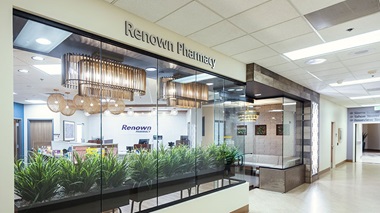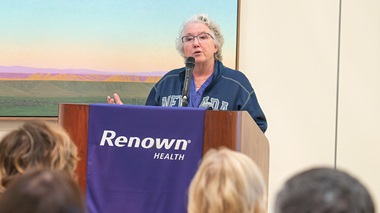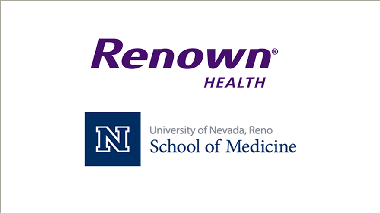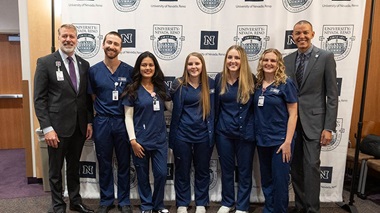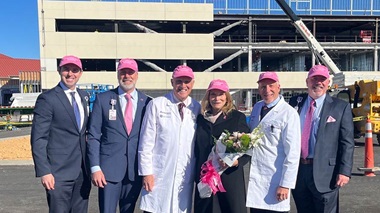Featured News
Careers
Awards & Accreditations
University of Nevada, Reno
Renown Health Foundation
Media Resources

Renown Health's public relations team supports media partners in finding experts on diverse health care topics. In addition, we provide information and answer all questions regarding Renown. We look forward to working with you.
-
Media On Campus
For patient confidentiality purposes, Renown Health policies require media to be escorted by the public relations staff at all times.
PR staff will gladly make parking arrangements, notify the appropriate hospital staff and help you find your destination.
Stand Ups/Live Broadcasts
Media may conduct stand ups and live broadcasts on our campuses. In the interest of patient confidentiality and traffic flow, a staff member will help you find the best location for your story.
We ask you to respect our obligation to protect our patients' well-being and legal right to privacy.
-
Patient Condition Inquiry
We follow regulations of the Health Insurance Portability and Accountability Act of 1996 (HIPAA) for all patients, including patients of public interest. HIPAA regulations specify which information may and may not be released without authorization from a patient.
Patient privacy regulations allow us to only share patient condition information about patients that appear in our directory.
Media inquiries require correct spelling of the patient's first and last name.
Definitions of "Condition" used by Renown Health
When describing a patient's condition, we can only release the following patient statuses:
Good - Vital signs such as pulse, temperature and blood pressure are stable and within normal limits. Patient is conscious, comfortable and there are no complications.
Fair - Vital signs are stable and within normal limits. Patient is conscious and alert although may be uncomfortable or in pain and may have minor complications.
Serious - Vital signs may be unstable or outside normal limits. The patient is acutely ill or injured and may have major complications.
Critical - Vital signs are unstable or outside normal limits. There are major complications.
Note: "Stable" is not a condition.
Press Releases
-
Research Shows Genetic Approaches to Breast Cancer Screenings Yield More Accurate Results
Clinical researchers with the Healthy Nevada Project co-author research paper with findings that emphasize the need for a comprehensive approach to breast cancer risk assessment – including a focus on genetic medicine – to help ensure that individuals at high risk are identified and supported proactively rather than reactively. Breast cancer is a leading cause of cancer death among women in the United States. According to the American Cancer Society, about 1 in 8 women will develop breast cancer and about 1 in 39 women will die from breast cancer. Breast cancer is associated with increased age, hereditary factors, obesity, and alcohol use. Since 1990, breast cancer death rates have declined progressively due to advancements in treatment and detection. In Nevada there are an estimated 2,310 new breast cancer cases a year, and genetic mutations such as in the genes BRCA1 or BRCA2 remain a top risk factor for this prevalent disease. Recognizing the urgency for progress in breast cancer research, a collaborative effort between physicians, advanced practice providers and scientists from the Healthy Nevada Project® (HNP) and Helix have unveiled groundbreaking research. This study explores how genetic screenings are a necessary supplement to traditional testing methods, together offering more accurate insights into a patient's likelihood of developing breast cancer in the future. HNP is operated by Renown Genomic Medicine and the Institute for Health Innovation and is one of the largest community-based population health studies in the country. Their team works in collaboration with Helix, a leader in precision health that delivers comprehensive genomic solutions. Together, this dynamic partnership aims to understand breast cancer risk factors and pave the way for more effective preventative measures. The combined research team studied 25,591 female HNP participants to evaluate the performance of different genetic screening approaches to identify women at high risk of breast cancer. The results of this research suggest that a combined monogenic, or single-gene, and polygenic, or multi-gene, approach to breast cancer screenings helped produce more accurate results and more closely identify study participants who have a high genetic risk of developing the disease. "Based on this research, we are advocating a shift in approach which would improve breast cancer risk assessment through a combination of effective family history ascertainment and genetic screening,” said Joseph Grzymski, PhD, principal investigator of the Healthy Nevada Project, research professor at the University of Nevada, Reno School of Medicine and co-author of the breast cancer research paper. “This tailored approach, founded on the assessment of individual genetic risk, not only intends to elevate patient well-being but also will improve efficiency and equity in healthcare." Complementing the team’s research on leveraging genetics to identify women at low genetic risk of breast cancer that could safely defer mammogram screenings by five to 10 years that was released in late 2023 in JAMA Oncology, the study suggests that incorporating genetic information can assist in personalizing breast cancer screenings and optimizing the use of screening resources. "Existing disparities persist across various facets of breast cancer screening and treatment; however, genetic screening is clearly a powerful tool to help facilitate early intervention for those at higher risk,” said Jamie Schnell Blitstein, APRN, a primary care nurse practitioner at Renown Health and co-author of the breast cancer research paper. “By placing a heightened focus on risk, we underscore the pivotal role of preventative breast cancer screening.” Despite the availability of effective methods for early screening, co-authors of this research found that 78 percent of women with a family history of breast cancer had their risk ascertained only after a breast cancer diagnosis. The findings emphasize the need for a comprehensive approach to breast cancer risk assessment – including a focus on genetic medicine – to help ensure that individuals at high risk are identified and supported proactively rather than reactively. “These findings that can profoundly impact how healthcare is delivered were only made possible by all the participants who were willing to consent to research,” said Alex Bolze, PhD from Helix and co-author of the publication. “Broad-scale collaboration projects like these between Renown Health and UNR that engage large populations where participants share both their genetic information as well as electronic health records drive advancements in preventative medicine, as well as fundamental biological research.” The research paper was officially accepted on Jan. 29, 2024, and will be published by Elsevier, Inc. on behalf of the American College of Medical Genetics and Genomics. The contents of the paper will appear in the international journal Genetics in Medicine Open. Read the full article by visiting sciencedirect.com. The Healthy Nevada Project is currently recruiting new study participants. Free to all Nevadans with a saliva sample or blood draw, participants and their referring providers receive access to whole-exome sequencing and clinical grade results that help provide insight into their unique genetic risks tied to heart disease and certain cancers. If you are interested in enrolling in the study, schedule a Virtual Consent Appointment through MyChart or contact the Renown Institute for Health Innovation at RenownIHI@renown.org or (775) 982-6914 to be connected to a Genomic Representative. About Renown Health Renown Health is the region’s largest, not-for-profit integrated healthcare network serving Nevada, Lake Tahoe and northeast California. With a diverse workforce of more than 7,000 employees, Renown has fostered a longstanding culture of excellence, determination and innovation. The organization comprises a trauma center, two acute care hospitals, a children’s hospital, a rehabilitation hospital, a medical group and urgent care network, and the region’s largest, locally owned not-for-profit insurance company, Hometown Health. Renown is currently enrolling participants in the largest community-based genetic population health study, the Healthy Nevada Project®. To join the Renown Health team, visit renown.org/careers. About Helix Helix is the leading population genomics and viral surveillance company operating at the intersection of clinical care, research, and data analytics. Helix enables health systems, life sciences companies, payers, and government partners to accelerate the integration of genomic data into patient care and public health decision-making. Learn more at helix.com.
-
Renown Recognized for Quality Care for Heart Attack & Failure
American Heart Association awards shine national spotlight on care offered in northern Nevada. Renown Regional Medical Center has been honored once again by the American Heart Association (AHA) for high quality heart care. Renown’s focus on quality and applying the most up-to-date, evidenced-based treatment guidelines improves patient outcomes, getting people home sooner and back to doing what they love. “We are pleased to recognize Renown for their commitment to heart failure care,” said Lee H. Schwamm, M.D., national chairperson of the Quality Oversight Committee and Executive Vice Chair of Neurology, Director of Acute Stroke Services, Massachusetts General Hospital, Boston, Massachusetts. “Recognizing the significance of preventing, diagnosing and caring for people with heart and vascular disease, which continues to be on the rise and taking far too many lives, is of critical importance to us at Renown,” says Tony Slonim, M.D., DrPH, FACHE, president and CEO, Renown Health. “We are proud of our incredible team for providing the highest-quality clinical care, and thank the American Heart Association for this national recognition.” Renown Regional was awarded The Get with the Guidelines – Heart Failure Gold Plus Quality Achievement award for continually ensuring heart failure patients receive the most appropriate treatment according to nationally recognized, research-based guidelines, as well as AHA’s Mission: Lifeline Gold Receiving honor for the treatment of patients who suffer severe heart attacks. “Renown offers the most highly-skilled and experienced heart and vascular team and the most advanced heart center in the region. Having national recognition for being the region’s heart care leader is critical to a Destination Health strategy,” said Josiah "Sy" Johnson, MBA, chief of staff for Renown Health. “We at Renown are proud to bring a high level of world-class care providers, leading-edge care and new delivery approaches to meet the needs of people in northern Nevada through our Institute for Heart & Vascular Health.” Why This Recognition Matters to You - Heart Attack Care Every year, more than 250,000 people experience an ST elevation myocardial infarction (STEMI), the deadliest type of heart attack, caused by a blockage of blood flow to the heart that requires timely treatment. Renown earned the award by meeting specific criteria and standards of performance for quick treatment to re-establish blood flow to blocked arteries in heart attack patients. “Our expert staff treat problems that extend from mild to the most critical of emergencies,” said Christopher M. Kozlowski, MD, MHA, vice president and medical director of Renown Institute for Heart & Vascular Health. “Specialized physicians including cardiologists, interventional radiologists, heart and vascular surgeons, emergency medicine and trauma surgeons, primary care providers, nurses and other clinicians work as a team to determine the best treatment plan for each patient. We encourage all patients to discuss with their care team whether they should undergo formal screening for early heart disease.” Why This Recognition Matters to You - Heart Failure Care According to the AHA, more than 6.5 million adults in the United States are living with heart failure. Heart failure patients can lead full, enjoyable lives when their condition is managed with proper medications or devices and with healthy lifestyle changes. “Renown’s reputation as the region’s heart care leader has been built over many years. We performed the area’s first open-heart surgery, angioplasty, stent and valve replacements decades ago. Renown Regional offers incredible advancements like trans-catheter aortic valve replacement (TAVR) and trans-catheter mitral valve repair (TMVr) with MitraClip therapy, lifesaving alternatives to open-heart surgery for patients considered high-risk or inoperable,” said Erik Olson, chief executive officer of Renown Regional Medical Center. “Offering the highest level of comprehensive care for patients experiencing cardiac and vascular disease, Renown developed its first division of cardiothoracic surgery dedicated to heart surgery patients in 2019.” The Renown Institute for Heart & Vascular Health program now offers a Diagnostic Electrophysiology Lab; a Chest Pain Center using the D-SPECT® heart camera; multiple Interventional Labs; Heart Failure Program; several Cardiac Catheterization Labs; Interventional Cardiology and Cardiac Surgery when necessary; and the only Pritikin-certified Healthy Heart Program in the West, creating individualized rehabilitation plans tailored to each patient’s needs, so they can exercise safely, eat healthy, manage stress and cook nourishing, balanced meals, all while gaining a healthy mindset. Renown is among the nation’s top-performing hospitals for heart attack treatment and one of only 105 hospitals nationwide to receive the American College of Cardiology ACTION Registry Silver Performance Achievement Award recognizing success in implementing a higher standard of care for heart attack patients. Renown’s Roseview, Sierra and Cardiac Intensive Care Units (ICUs) are the only ICUs in Nevada to receive the Beacon Award of Excellence from the American Association of Critical Care Nurses. U.S. News and World Report’s Best Hospital rankings recently named Renown hospitals as best in the state of Nevada. Patients in need of advanced heart care can speak with their care provider about Renown Medical Group – Specialty Care, which can be reached at 775-982-6270 or visit renown.org/HeartCare. About Renown Health Renown Health is the region’s largest, locally owned and governed, not-for-profit integrated healthcare network serving Nevada, Lake Tahoe and northeast California. With a diverse workforce of more than 7,000 employees, Renown has fostered a longstanding culture of excellence, determination and innovation. The organization comprises a trauma center, two acute care hospitals, a children’s hospital, a rehabilitation hospital, a medical group and urgent care network, and the region’s largest, locally owned not-for-profit insurance company, Hometown Health. Renown’s institute model addresses social determinants of health and includes: Child Health, Behavioral Health & Addiction, Healthy Aging and Health Innovation. Clinical institutes include: Cancer, Heart and Vascular Heath, Neurosciences and Robotic Surgery. Renown is currently enrolling participants in the world’s largest community-based genetic population health study, the Healthy Nevada Project®. For more information, visit renown.org. About Mission: Lifeline The American Heart Association’s Mission: Lifeline program helps hospitals and emergency medical services develop systems of care that follow proven standards and procedures for STEMI patients. The program works by mobilizing teams across the continuum of care to implement American Heart Association/American College of Cardiology Foundation clinical treatment guidelines. For more information, visit heart.org. About Get With The Guidelines Get With The Guidelines® is the American Heart Association/American Stroke Association’s hospital-based quality improvement program that provides hospitals with the latest research-based guidelines. Developed with the goal of saving lives and hastening recovery, Get With The Guidelines has touched the lives of more than 9 million patients since 2001. For more information, visit heart.org.
Read More About Renown Recognized for Quality Care for Heart Attack & Failure

